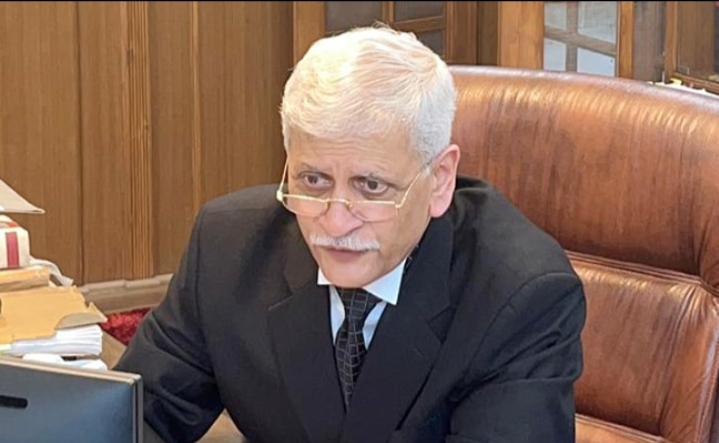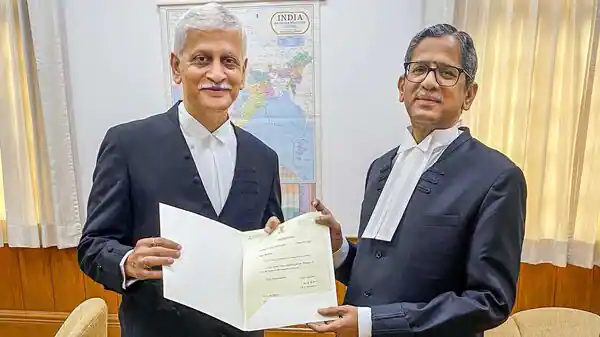Justice UU Lalit appointed as the 49th Chief Justice of India

NEW DELHI: The law ministry on Wednesday notified the appointment of Justice Uday Umesh Lalit as the next Chief Justice of India, succeeding CJI N V Ramana who demits office on August 26 after a 16-month tenure as the head of the country’s highest court.
He was elevated directly from the Bar as the judge of the Supreme Court in August 2014 and will be the second such judge in the history of the apex court to be appointed as the CJI. However, he will have a very brief period of three months as the CJI since he retires on November 8 when he turns 65.
5 Points On New Chief Justice of India
- Justice UU Lalit has been appointed on the recommendation of CJI NV Ramana, who will demit office on August 26. Justice UU Lalit will have a 74-day tenure as Chief Justice and will retire on November 8.
- Born on November 9, 1957, at Solapur in Maharashtra, Justice UU Lalit enrolled as an advocate by the Bar Council of Maharashtra and Goa in June 1983. He practiced in the High Court of Bombay till December 1985 before shifting his practice to Delhi in January 1986
- specializes in criminal law and conducted trials as CBI’s Special Public Prosecutor in all 2G matters. He also served as a member of the Supreme Court’s Legal Services Committee for two terms
- And was appointed as a judge of the Supreme Court in August 2014 by the Bar. He is the second Chief Justice to be directly elevated to the Supreme Court from the Bar, after Justice SM Sikri, who served as the 13th CJI in 1971
- He has been part of many important cases and delivered some landmark judgments, the most notable being the Triple Talaq verdict, in the case of the Travancore royal family’s claim of management rights of the Padmanabhaswamy Temple in Kerala and a judgment on the law involving sexual offenses against children (POCSO).
“In exercise of the powers conferred by clause (2) of Article 124 of the Constitution of India, the President is pleased to appoint Justice Uday Umesh Lalit, Judge of the Supreme Court, to be the Chief Justice of India with effect from 27 August 2022,” the government notification read.
Justice UU Lalit is the senior-most judge of the SC after the incumbent CJI N V Ramana, and, as per the convention, the senior-most judge of the apex court is appointed as the CJI.
when he demits office in November, will be succeeded by Justice D Y Chandrachud, if the practice is followed.
Soon after the government issued notification for Justice Lalit, a statement issued from the apex court said: “CJI N V Ramana today congratulated Justice UU Lalit on being appointed as the 49th CJI. ”
UU Lalit Profile
Justice Uday Umesh Lalit enrolled as an advocate in June 1983. He practiced in the High Court of Bombay from 1983 to 1985 and former Attorney General Soli Sorabjee from 1986 to 1992.
In 2004, the Supreme Court designated him as a Senior Advocate. He specialized in criminal law. He conducted trials as CBI’s Special Public Prosecutor in all 2G matters, under the Supreme Court’s orders. He also served as a member of the Supreme Court’s Legal Services Committee for two terms.
Lalit J was elevated as a Judge of the Supreme Court directly from the Bar on August 13th, 2014. In May 2021, Lalit J was appointed as the Executive Chairman of the National Legal Services Authority (NALSA).
In 2022, he is likely to preside over the Chief Justice of India.
During his tenure, UU Lalit J recused himself from several high-profile cases. In 2014, he recused himself from hearing Yakub Menon’s plea seeking a review of the Supreme Court’s order upholding his capital punishment in the 1993 Mumbai serial blasts case. In 2015, he recused himself from hearing a petition filed seeking a fair trial in the 2008 Malegaon blasts, as he had defended one of the accused earlier. In 2016, he recused himself from a plea hearing seeking a probe into the disappearance of a key prosecution witness in the trial of Asaram Bapu.
Furthermore, he also recused himself from hearing a plea by former Haryana Chief Minister Om Prakash Chautala in the teachers’ recruitment scam case. In 2017, he recused himself from hearing the appeals in the Suryanelli rape case since he had appeared for one of the accused persons earlier. In 2018, he recused himself from hearing the petition of an accused in the Malegaon blast seeking a probe into alleged torture and coercion by law enforcement authorities. In 2019, Justice Lalit recused himself from the Constitution Bench responsible for hearing the Ayodhya Title Dispute.
Notable Judgments
Lalit J and Goel J introduced three procedural safeguards to prevent the ‘misuse’ of the SC/ST (Prevention of Atrocities) Act. In Kashinath Mahajan v State of Maharashtra, they set out the following procedure-
1. Conduct of preliminary inquiry before the registration of the FIR
2. Investigation officer obtaining further approval before carrying out an arrest
3. Provision for grant of anticipatory bail under the Act
And Joseph J, in Ranjana Kumari v State of Uttarakhand, ruled that a migrant cannot be recognized as a Scheduled Caste person in the migrant state, merely because that state recognizes the specific caste as a Scheduled Caste.
he was on the Constitution Bench that heard the controversial 2017 Triple Talaq case. The Shayara Bano Bench negated the validity of Triple Talaq. Justice Lalit held that Triple Talaq violated the fundamental right guaranteed in Article 14.
In Pradyuman Bisht v Union of India, Lalit J and Goel J directed that CCTV cameras (without audio recordings) be installed inside courts, and in important locations in the court complex, in at least two districts in every state. However, they ordered that these recordings will not be subject to the Right to Information Act.
on the 2-judge Bench of the Supreme Court that held that the prescribed 6-month waiting period under Section 13B(2) of the Hindu Marriage Act, for divorce by mutual consent, is not mandatory. His judgment with Goel J in Amardeep Singh v Harveen Kaur settled a contentious issue by holding that the prescribed waiting period can be waived under certain circumstances.












